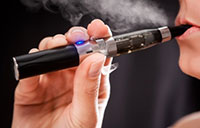 There is a lot of stir about the introduction of e-cigarettes and unknown health issues that they may cause. For the mouth, e-cigarettes seem to have some positives and negatives. It is a better option than regular tobacco cigarettes, but worse than not smoking altogether. Here are a few of the effects of e-cigarettes on the mouth.
There is a lot of stir about the introduction of e-cigarettes and unknown health issues that they may cause. For the mouth, e-cigarettes seem to have some positives and negatives. It is a better option than regular tobacco cigarettes, but worse than not smoking altogether. Here are a few of the effects of e-cigarettes on the mouth.
Unfortunately, research on e-cigarettes is still very minimal. Because they are a new product, research that can space several decades is still unavailable. However, there are several chemicals and clues that help determine what e-cigarettes can do to the teeth.
Just like any cigarette, the main purpose of an e-cigarette is to inhale nicotine. Studies have shown that nicotine can slow down the production of saliva in the mouth. The more nicotine you intake, the less saliva the body is able to produce. Saliva is a main deterrent to harmful bacteria and food particles in the mouth. Low saliva levels can cause quicker tooth decay, sore gums, and eventually a loosening of the teeth. One positive of smoking e-cigarettes verses normal cigarettes is that you can control the amount of nicotine the e-cigarette will release into the body. This will slow down the eventual effect of lowered saliva levels, at least.
Another effect of nicotine in an e-cigarette or a tobacco cigarette is it acts as a vasoconstrictor, which prohibits blood flow to the mouth. This results in a fewer number of white blood cells capable of fending off infections and bacteria that harm your gums. Fewer red blood cells are also sent to your mouth tissues, which lead to faster deterioration of the tissue and your teeth.
Another concern for e-cigarettes is that they contain diethylene glycol, a highly toxic substance. However, at the current point in research, scientists have not determined how much of the substance is needed to be considered harmful to the body, especially seeing e-cigarettes use a very low amount.
There are a few positives to using e-cigarettes, though they do not outweigh the negatives. For example, e-cigarettes use ingredients such as glycerin and propylene glycol. These are two chemicals are used in toothpaste to help prevent water loss in the paste. The chemicals in e-cigarettes can actually create a coating over the teeth’s surface that can prevent teeth from drying up as well as help kill certain bacteria in the mouth.
What E-Cigarettes Won’t Do (Verses Tobacco Cigarettes)
Compared to tobacco cigarettes, e-cigarettes do have the upper hand. Unlike tobacco cigarettes, e-cigarettes don’t cause a few of the more unpleasant side effects that are caused by tobacco.
Tobacco cigarettes can cause yellowing of teeth. E-cigarettes, however, do not cause this problem. They do not include the harmful chemicals that cause the discoloring.
When your mouth is sore, either from biting your lip or a serious mouth surgery, smoking tobacco cigarettes causes healing to become a longer, more prolonged process. E-cigarettes do not have the same effect on the healing process, which makes it easier to smoke after a surgery or injury.
Also, e-cigarettes are made from water vapor and nicotine, so the usual after-smell and taste that comes with a tobacco cigarette is completely diminished. E-cigarettes are also sold in flavors such as vanilla and mint, which leave a pleasant after-taste for you and those you are close to.
While we don’t encourage any of our patients or readers to start using e-cigarettes, we do believe it may be a smart way to slowly wean off of and eventually quit smoking. While it is still harmful to your mouth, research so far has shown that it does not seem to be as harmful as tobacco cigarettes. However, as we said before, time will be the true determinant for the e-cigarette.
If you have more questions on e-cigarettes and the effect they have on your teeth and mouth, contact Water Tower Dental today. We would be happy to answer all of your questions.






 Website Powered by Sesame 24-7™
Website Powered by Sesame 24-7™